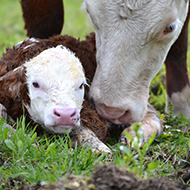
Researchers assess nutrition status in suckler cows before and after calving.
Researchers at Scotland's Rural College (SRUC) have found that metabolic profile testing could improve calving performance in beef cattle
Metabolic profile (MP) testing is commonly used in dairy herds to investigate the nutritional status of pre-calving and early lactation cows, but its uptake among beef producers has been slow.
In the study, researchers found the MP testing can highlight nutritional issues in beef cattle that could affect calving performance, milk production and fertility. They also found the tool can help to identify management issues, such as inadequate feed space.
The study was led by SAC Consulting, part of SRUC, over 12 months at farms in Angus and Fife. Researchers tested 180 cows around one month before and calving to assess nutritional status. The cows were also given a body condition score.
They found that a third of cows were deficient in magnesium pre-calving - a significant finding, given that low magnesium levels can impact slow calving and, potentially, the health of the calf. The team also found that a quarter of cows were deficient in magnesium post-calving - an issue that can increase the risk of grass staggers disease.
“Another finding was that over half the cows were short of rumen-available protein in the ration pre-calving which, if left uncorrected, may impact colostrum quality and milk production,” explained SAC consulting nutritionist Karen Stewart.
“The study also highlighted energy deficiencies and, with corrective action, helped to safeguard calving performance and getting cows back in calf. In some cases, the ration looked ideal on paper and was based on silage analysis, but feed access issues, weather and other environmental factors negatively affected the animal’s nutritional status."
She added that trace elements and other major minerals, except magnesium, were not deficient, and cows were generally well supplemented.



 The Veterinary Medicines Directorate (VMD) is inviting applications from veterinary students to attend a one-week extramural studies (EMS) placement in July 2026.
The Veterinary Medicines Directorate (VMD) is inviting applications from veterinary students to attend a one-week extramural studies (EMS) placement in July 2026.